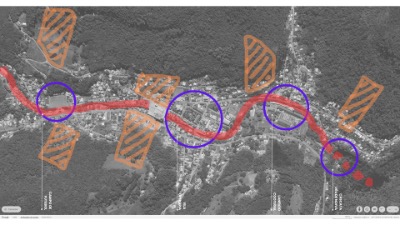University of Westminster: Luz Navarro & Giulio Verdini, Universidade de Caxias do Sul : Dr Rafael de Lucena Perini & Prof. Dr. Ana Cristina Fachinelli Research 2025

Areas for a resilient urban future: Co-produced map result of the participatory mapping workshops with residents of Galopolis
Areas for a Resilient Urban Future: Participatory mapping workshops, Galopolis
Funded by ESRC
In May 2024, the city of Caxias do Sul in southern Brazil was devastated by catastrophic floods and landslides that caused over a hundred fatalities, numerous injuries and the evacuation of thousands in the region. The disaster had profound consequences for public health, infrastructure and economic development. This research explores how local authorities can build more resilient cities by adopting place-based civic engagement strategies tailored to local contexts, taking specific vulnerabilities and strengths into account. The project draws on the concept of evolutionary resilience, which is not only the capacity to return to a pre-disaster state, but to adapt, evolve and transform in the face of future risks. Focusing on two critical post-disaster challenges, disaster governance and understanding social spatial vulnerabilities, the project involves a multi-method, participatory approach. Funded by the Economic and Social Research Council (ESRC), it brings together policymakers, civil society organisations, businesses, researchers from Brazil and the UK, and the local community of Galópolis. A series of four participatory workshops held in March 2025 facilitated the co-development of tools and strategies to enhance community involvement in the planning of a more climate resilient urban future.
Preliminary findings suggest that integrating local knowledge through participatory co-design approaches leads to more effective and context-sensitive resilience planning than traditional top-down models. The project reframes resilience governance as a social and inclusive process rather than a purely technical one, emphasising justice, community agency and the co-production of policy. It highlights how grassroots participation can strengthen long-term urban resilience and climate justice in vulnerable urban contexts, particularly in small and medium-sized cities across the global south.
Ultimately, this research offers scalable pathways for embedding civic engagement into climate governance, contributing both theoretical and practical insights for urban planners, policymakers and researchers committed to transformative action in the face of accelerating climate disasters.
